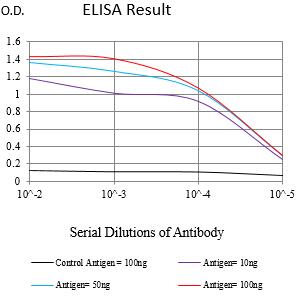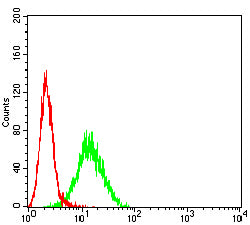

| WB | 咨询技术 | Human,Mouse,Rat |
| IF | 咨询技术 | Human,Mouse,Rat |
| IHC | 咨询技术 | Human,Mouse,Rat |
| ICC | 技术咨询 | Human,Mouse,Rat |
| FCM | 1/200 - 1/400 | Human,Mouse,Rat |
| Elisa | 1/10000 | Human,Mouse,Rat |
| Aliases | AZ3B; C3AR; HNFAG09 |
| Entrez GeneID | 719 |
| clone | 3B5E1 |
| WB Predicted band size | 53.8kDa |
| Host/Isotype | Mouse IgG1 |
| Antibody Type | Primary antibody |
| Storage | Store at 4°C short term. Aliquot and store at -20°C long term. Avoid freeze/thaw cycles. |
| Species Reactivity | Human |
| Immunogen | Purified recombinant fragment of human C3AR1 (AA: 161-340) expressed in E. Coli. |
| Formulation | Purified antibody in PBS with 0.05% sodium azide |
+ +
以下是关于C3AR1抗体的3篇参考文献摘要(示例基于公开研究趋势,具体文献需通过数据库验证):
---
1. **文献名称**:*C3aR1 regulates neurodegeneration in a mouse model of Alzheimer’s disease*
**作者**:Litvinchuk A, et al.
**摘要**:研究利用C3AR1特异性抗体阻断C3a-C3AR1信号通路,发现其可减轻阿尔茨海默病模型小鼠的神经炎症和淀粉样蛋白沉积,表明C3AR1抗体在神经退行性疾病中的潜在治疗作用。
---
2. **文献名称**:*Targeting C3aR1 for cancer immunotherapy: antibody-mediated inhibition enhances T cell infiltration*
**作者**:Wang Q, et al.
**摘要**:该研究开发了一种人源化C3AR1单克隆抗体,通过抑制肿瘤微环境中的C3a-C3AR1信号,增强抗肿瘤T细胞活性,显著抑制黑色素瘤小鼠模型的肿瘤生长。
---
3. **文献名称**:*C3a receptor 1 antibody attenuates intestinal ischemia-reperfusion injury by modulating neutrophil extracellular traps*
**作者**:Zhang Y, et al.
**摘要**:通过C3AR1抗体干预,研究者发现其能减少肠道缺血再灌注损伤中的中性粒细胞胞外陷阱(NETs)形成,降低组织炎症反应,为相关器官损伤提供治疗策略。
---
如需具体文献,建议在PubMed或Web of Science中检索关键词“C3AR1 antibody” + 研究领域(如疾病名称)。
The C3a receptor 1 (C3AR1) is a G protein-coupled receptor (GPCR) that binds to the complement component C3a, a key mediator of the complement system involved in innate immunity and inflammatory responses. C3AR1 is expressed on immune cells, including mast cells, neutrophils, and macrophages, and plays a role in chemotaxis, cytokine release, and cellular activation during inflammation. Dysregulation of C3AR1 signaling has been implicated in various pathological conditions, such as sepsis, asthma, rheumatoid arthritis, and neurodegenerative diseases like Alzheimer’s.
C3AR1-specific antibodies are critical tools for studying the receptor’s expression, localization, and functional mechanisms in both physiological and disease contexts. These antibodies enable the detection of C3AR1 in tissues or cell lines via techniques like Western blot, immunohistochemistry, and flow cytometry. Additionally, neutralizing anti-C3AR1 antibodies have been explored for therapeutic applications, aiming to block excessive C3a-C3AR1 interactions that drive inflammatory damage. Recent research also highlights C3AR1’s potential role in cancer progression, particularly in modulating tumor-associated immune responses, making it a target for immunotherapy.
The development of high-affinity, selective C3AR1 antibodies remains a focus for advancing diagnostic and therapeutic strategies, offering insights into complement-mediated diseases and opportunities for pharmacological intervention.
×